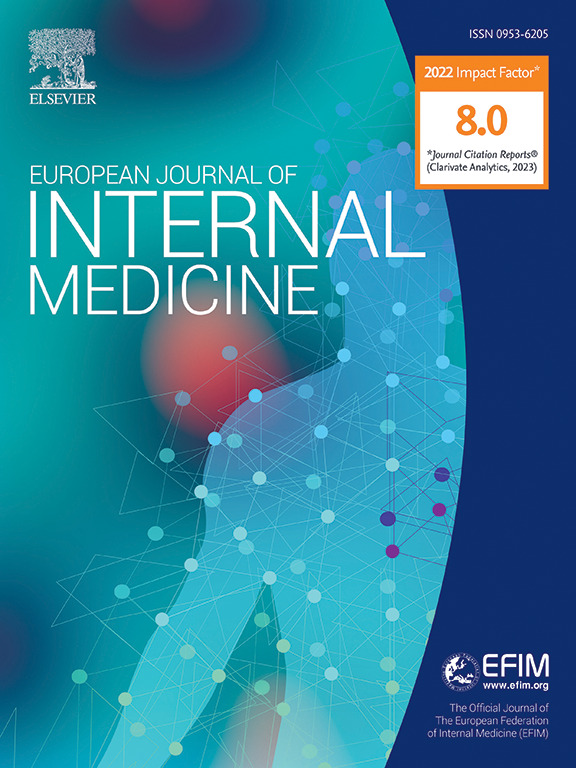Modifiable lifestyle factors in the primordial prevention of hypertension in three US cohorts
IF 5.9
2区 医学
Q1 MEDICINE, GENERAL & INTERNAL
引用次数: 0
Abstract
Background
Evidence is lacking on the relative contributions of specific lifestyle factors and their overall contribution to prevention of hypertension, in particular early-onset hypertension.
Methods
This prospective cohort study included participants of the Nurses’ Health Study (NHS, N = 52,780 women, aged 40–67 in 1986), the NHS II (N = 83,871 women, aged 27–46 in 1991), and the Health Professionals Follow-up Study (HPFS, N = 31,269 men, aged 40–75 in 1986), who were free from hypertension, cardiovascular disease and cancer at baseline. Four modifiable lifestyles were evaluated based on hypertension guidelines: BMI, moderate-to-vigorous physical activity, Dietary Approaches to Stop Hypertension (DASH) score, and alcohol intake. Primary outcome was incident self-reported diagnosis of hypertension with 27–31 years of follow-up.
Results
Each lifestyle factor was associated with incident hypertension in dose-dependent manners across the cohorts, with BMI having the strongest associations. On average, adhering to BMI <25 kg/m2 was associated with 20.3 [18.5, 22.0], 25.0 [23.2, 26.8], and 18.6 [16.7, 20.7] months longer periods free from hypertension during 25-year follow-up in each cohort respectively. BMI accounted for approximately 20 % of incident hypertension in NHS and HPFS, and 35 % of early-onset hypertension (age < 55 y). Moderate-to-vigorous physical activity and diet accounted for 10–15 % of incident hypertension in women, and the contributions were greater for early-onset hypertension.
Conclusion
Healthy weight during adulthood was most substantially associated with incident hypertension among lifestyle factors, but diet, physical activity, and alcohol intake were also related to the risk across all ages, and hypertension-free periods, with stronger associations in early-onset hypertension.

美国三个队列中可改变的生活方式因素对高血压的初步预防作用。
背景:关于特定生活方式因素的相对贡献及其对预防高血压(尤其是早发性高血压)的总体贡献,目前还缺乏证据:这项前瞻性队列研究包括护士健康研究(NHS,N = 52,780 名女性,1986 年年龄为 40-67 岁)、护士健康研究 II(N = 83,871 名女性,1991 年年龄为 27-46 岁)和健康专业人员随访研究(HPFS,N = 31,269 名男性,1986 年年龄为 40-75 岁)的参与者,他们在基线时没有高血压、心血管疾病和癌症。根据高血压指南,对四种可改变的生活方式进行了评估:体重指数(BMI)、中度至剧烈运动、饮食疗法(DASH)评分和酒精摄入量。主要结果是在 27-31 年的随访中自我报告的高血压诊断事件:结果:在所有队列中,每个生活方式因素都与高血压的发生有剂量依赖关系,其中与体重指数的关系最为密切。平均而言,在 25 年的随访过程中,坚持体重指数 2 与高血压发生率的相关性分别为 20.3 [18.5, 22.0]、25.0 [23.2, 26.8]和 18.6 [16.7, 20.7]个月。在NHS和HPFS中,BMI约占高血压发病率的20%,占早发性高血压(年龄小于55岁)的35%。适度到剧烈的体育锻炼和饮食占女性高血压发病率的10%-15%,对早发性高血压的影响更大:结论:在生活方式因素中,成年期健康体重与高血压发病率的关系最为密切,但饮食、体育锻炼和酒精摄入也与所有年龄段和无高血压期的风险有关,与早发性高血压的关系更为密切。
本文章由计算机程序翻译,如有差异,请以英文原文为准。
求助全文
约1分钟内获得全文
求助全文
来源期刊
CiteScore
9.60
自引率
6.20%
发文量
364
审稿时长
20 days
期刊介绍:
The European Journal of Internal Medicine serves as the official journal of the European Federation of Internal Medicine and is the primary scientific reference for European academic and non-academic internists. It is dedicated to advancing science and practice in internal medicine across Europe. The journal publishes original articles, editorials, reviews, internal medicine flashcards, and other relevant information in the field. Both translational medicine and clinical studies are emphasized. EJIM aspires to be a leading platform for excellent clinical studies, with a focus on enhancing the quality of healthcare in European hospitals.

 求助内容:
求助内容: 应助结果提醒方式:
应助结果提醒方式:


